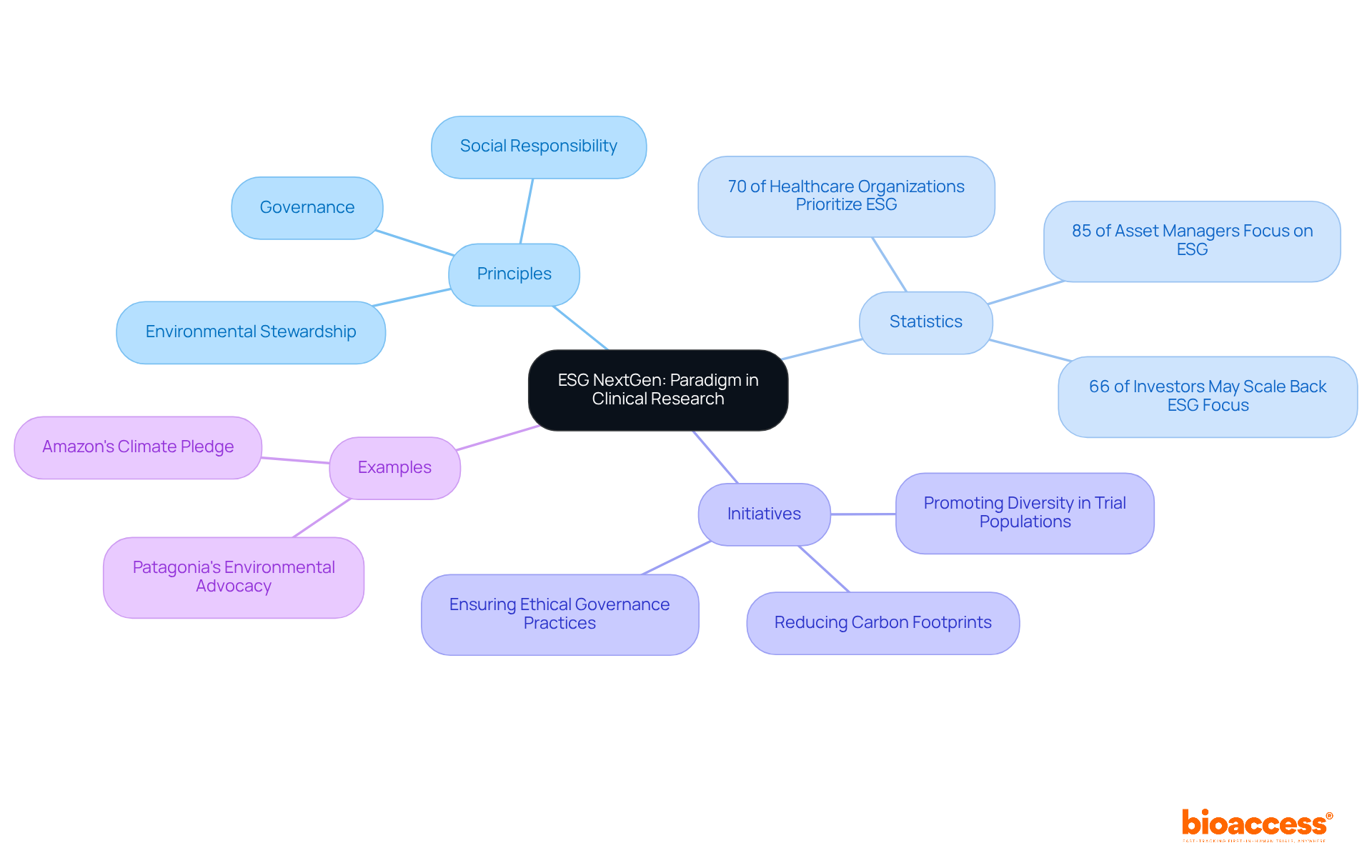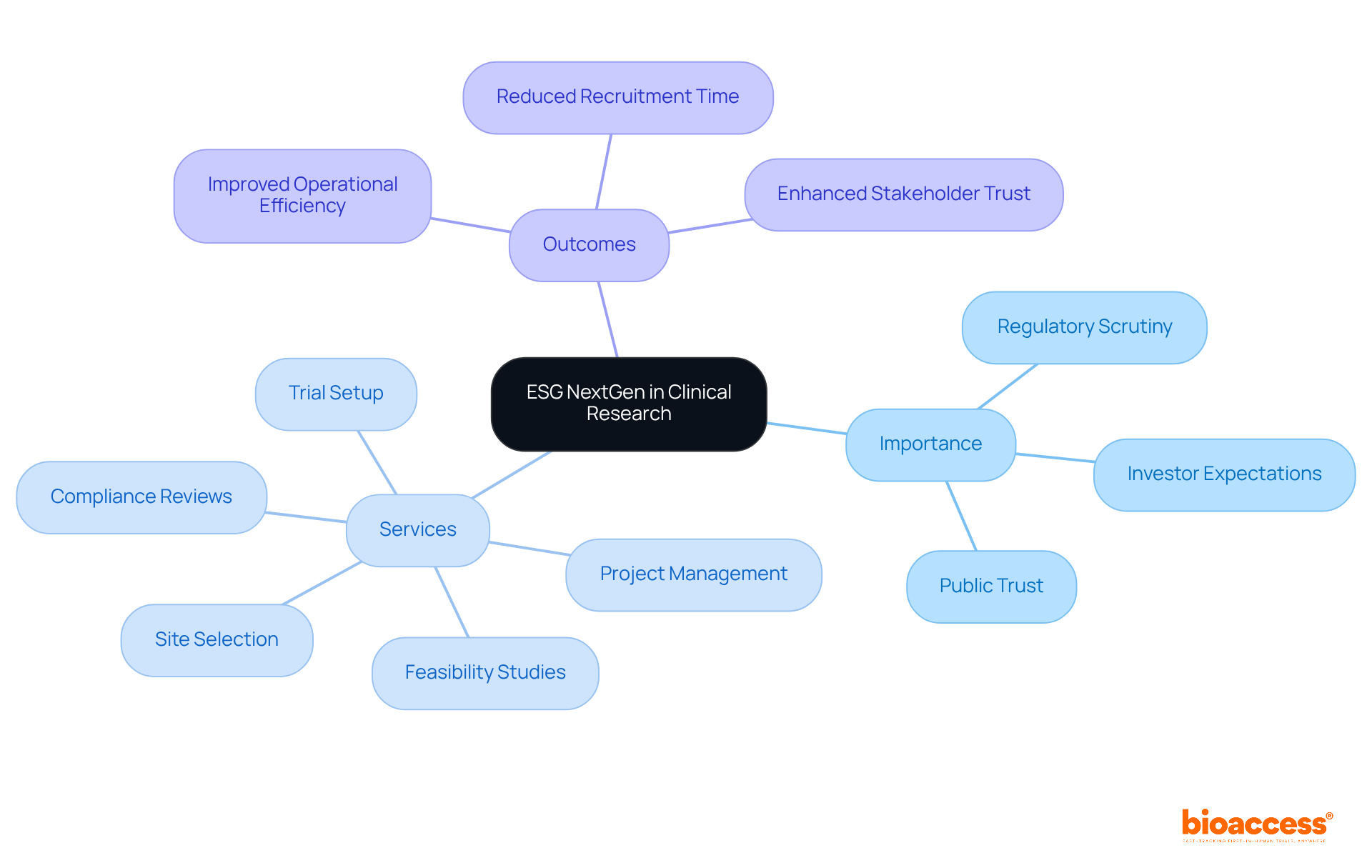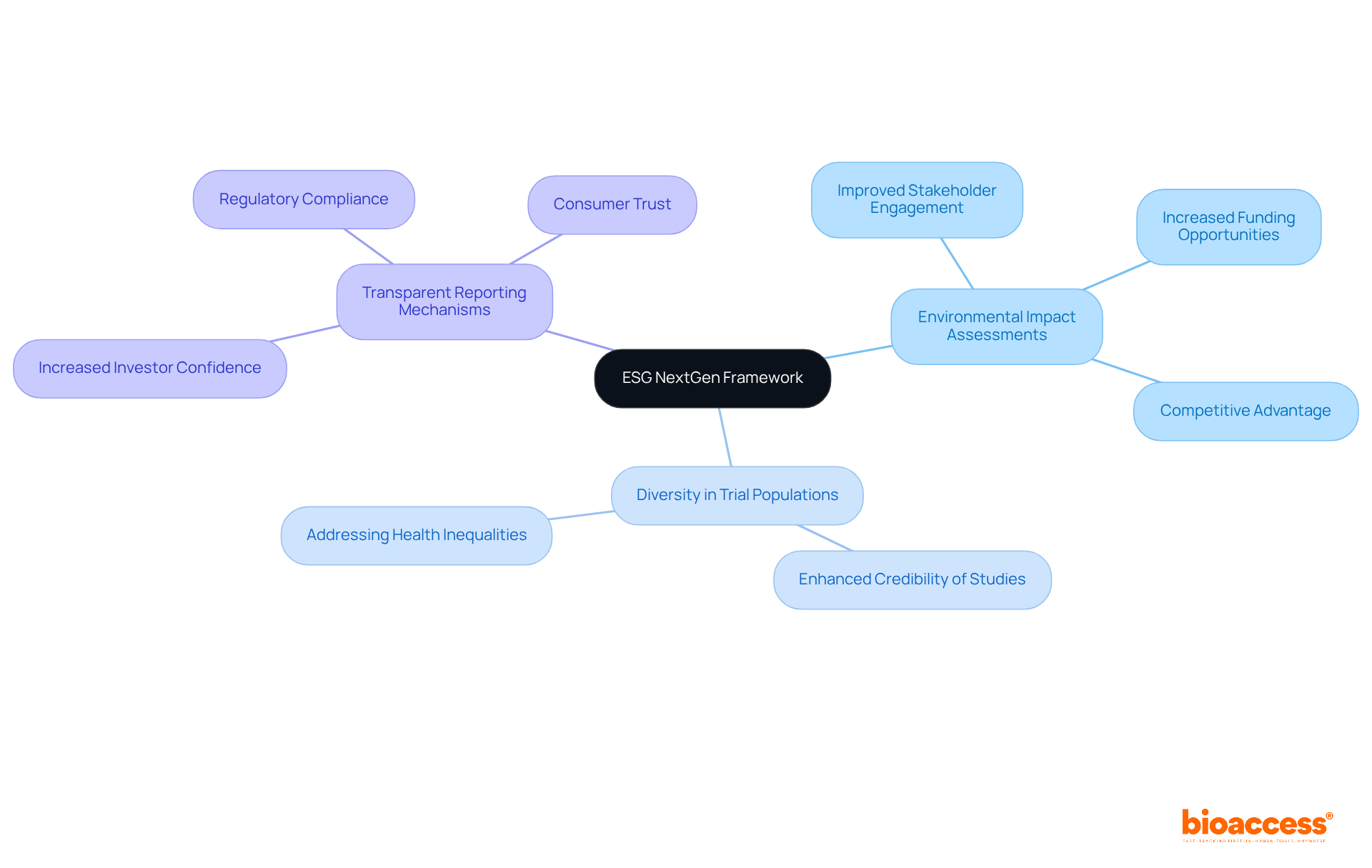


ESG NextGen represents a significant shift in clinical research, focusing on Environmental, Social, and Governance principles to promote sustainability and ethical practices within the healthcare sector. This approach is increasingly relevant as demands for transparency and accountability grow. By prioritizing diversity in trial populations and implementing comprehensive reporting mechanisms, ESG NextGen enhances patient outcomes and builds stakeholder trust.
In the evolving Medtech landscape, ESG principles play a crucial role in addressing key challenges. For instance, organizations that adopt these practices not only comply with regulatory expectations but also foster innovation and collaboration. How can your organization leverage these principles to improve its clinical research outcomes?
Ultimately, the importance of collaboration cannot be overstated. As stakeholders come together to embrace ESG NextGen, they pave the way for a more sustainable and ethical healthcare future. The next steps involve actively engaging with these principles and integrating them into your clinical research strategies.
The healthcare sector is experiencing a profound transformation, driven by an urgent need for sustainability and ethical governance in clinical research. ESG NextGen stands out as a pioneering framework that not only meets these demands but also bolsters the integrity and effectiveness of medical trials.
As organizations work to align with global sustainability objectives, one pivotal question emerges: how can the adoption of ESG principles reshape the future of clinical research, improve patient outcomes, and foster trust among stakeholders?
This inquiry is not just relevant; it is essential for navigating the complexities of modern healthcare.
ESG NextGen represents the forthcoming evolution of Environmental, Social, and Governance (ESG) frameworks specifically designed for research within the healthcare sector. This initiative encompasses a set of principles and practices aimed at enhancing the sustainability and ethical dimensions of research trials. By emphasizing environmental stewardship, social responsibility, and robust governance frameworks, ESG NextGen transforms the planning and execution of research studies. This shift is propelled by an increasing demand for transparency, accountability, and alignment with global sustainability objectives, ultimately striving to enhance patient outcomes and build trust among stakeholders in the healthcare ecosystem.
Recent statistics reveal that:
The latest advancements in ESG principles for medical trials underscore the necessity for comprehensive reporting and standardized practices. By 2025, mandatory ESG reporting is anticipated to become the norm, emphasizing the urgency for organizations to adapt. This adaptation includes the adoption of frameworks that align with the United Nations Sustainable Development Goals (SDGs), which seek to tackle pressing global challenges. Successful examples of ESG frameworks in research studies include initiatives aimed at:
For instance, Patagonia's Environmental Advocacy exemplifies how a strong commitment to ESG can foster high customer loyalty and enhance brand reputation. By embracing ESG NextGen, medical studies can significantly contribute to creating a more sustainable and equitable healthcare environment.

The significance of ESG NextGen in medical studies cannot be overstated, particularly as the healthcare industry faces heightened scrutiny from regulators, investors, and the public regarding ethical practices and sustainability. By embracing ESG principles, healthcare organizations can markedly improve operational efficiency, streamline patient recruitment and retention processes, and ultimately achieve better health outcomes.
Bioaccess exemplifies this approach by offering a comprehensive suite of services, including:
These services illustrate how organizations can adeptly navigate the complexities of clinical research. For instance, GlobalCare Clinical Trials partnered with Bioaccess to enhance its trial ambulatory services in Colombia, resulting in over a 50% reduction in recruitment time and a remarkable 95% retention rate. This alignment with ESG NextGen not only satisfies regulatory expectations but also fosters trust and credibility among stakeholders.
As Ali Cundari, Senior Director of Marketing and Corporate Communications, emphasizes, "Implementing sustainable strategies not only reduces the environmental impact but also aligns organizations involved in medical studies with the broader expectations of stakeholders, including patients, regulators, and investors." Furthermore, with 79% of investors considering how a company addresses ESG risks and opportunities as crucial in their investment decisions, organizations prioritizing ESG principles are better positioned to navigate the complexities of modern scientific studies while contributing positively to societal health improvements.

The evolution of ESG is fundamentally tied to the increasing acknowledgment of sustainable practices across various sectors, with healthcare being a prime example. The ESG framework began gaining traction in the early 2000s, driven by a growing awareness of environmental challenges, social inequalities, and the pivotal role of governance in corporate conduct.
In healthcare studies, the adoption of ESG principles has been significantly influenced by regulatory shifts and escalating stakeholder demands for transparency and ethical trial design. Noteworthy initiatives from the FDA, such as the Electronic Submissions Gateway, illustrate a broader movement aimed at modernizing regulatory frameworks to align with these emerging standards.
Consequently, esg nextgen embodies a collective effort to foster a more responsible and sustainable approach to research, underscoring the industry's commitment to ethical standards and societal impact.

The esg nextgen framework is distinguished by its unwavering commitment to sustainability, ethical governance, and social responsibility. It encompasses essential elements such as:
By applying the principles of esg nextgen, organizations can significantly enhance the credibility and integrity of their medical studies. This not only fosters innovation but also supports the development of therapies aimed at addressing critical health inequalities.
Organizations embracing these principles often experience:
Aligning medical research practices with ESG NextGen standards enables organizations to contribute to a healthier society while achieving their business objectives. Notably, nearly 80% of investors regard ESG factors as crucial in their investment decisions, highlighting the importance of these practices in attracting funding.
Moreover, with ESG-focused institutional investments projected to reach $33.9 trillion by 2026, integrating sustainability into clinical trials is becoming vital for long-term success. Case studies demonstrate that companies prioritizing environmental assessments in their trials not only bolster their credibility but also meet consumer expectations, as 88% of consumers desire businesses to actively engage in social and environmental issues. This alignment not only satisfies regulatory demands but also positions organizations favorably in a rapidly evolving market.

Embracing ESG NextGen marks a pivotal shift in clinical research, emphasizing the integration of Environmental, Social, and Governance principles to enhance the ethical and sustainable dimensions of healthcare studies. This innovative framework not only aims to improve patient outcomes but also fosters greater transparency and accountability among stakeholders, ultimately reinforcing trust within the healthcare ecosystem.
The growing commitment of healthcare organizations to prioritize ESG principles is evident, with over 70% actively integrating these considerations into their operations. Successful case studies, such as the partnership between Bioaccess and GlobalCare Clinical Trials, illustrate how ESG NextGen can streamline processes and improve retention rates, showcasing the tangible benefits of adopting these frameworks. Furthermore, the anticipated shift towards mandatory ESG reporting by 2025 underscores the urgency for organizations to adapt and align their practices with global sustainability objectives.
In a world increasingly focused on ethical practices and environmental impacts, adopting ESG NextGen in clinical research is not merely a trend but a necessity. Organizations that embrace this paradigm are better positioned to navigate the complexities of modern healthcare while making meaningful contributions to societal health improvements. As the emphasis on sustainability continues to grow, stakeholders are encouraged to advocate for and implement ESG principles, ensuring that clinical research evolves to prioritize both ethical integrity and positive health outcomes for all.
What is ESG NextGen?
ESG NextGen is the evolving framework of Environmental, Social, and Governance (ESG) principles specifically designed for clinical research in the healthcare sector. It focuses on enhancing sustainability and ethical practices in research trials.
What are the main goals of ESG NextGen?
The main goals of ESG NextGen include promoting environmental stewardship, social responsibility, and strong governance frameworks to improve the planning and execution of research studies, enhance patient outcomes, and build trust among stakeholders.
Why is there a growing emphasis on ESG principles in healthcare?
There is a growing emphasis on ESG principles in healthcare due to increasing demands for transparency, accountability, and alignment with global sustainability objectives, as well as the recognition of sustainability's importance in the sector.
What statistics highlight the importance of ESG in healthcare?
Over 70% of healthcare organizations are prioritizing ESG principles, and 85% of asset managers are focusing on ESG considerations. However, 66% of investors may reduce their focus on ESG factors, indicating potential risks if these principles are neglected.
What changes are expected regarding ESG reporting in the near future?
By 2025, mandatory ESG reporting is anticipated to become standard, necessitating organizations to adapt their practices to comply with these requirements.
How do ESG frameworks align with global initiatives?
ESG frameworks in clinical research are expected to align with the United Nations Sustainable Development Goals (SDGs), which address pressing global challenges.
What are some successful examples of ESG initiatives in research studies?
Successful ESG initiatives in research studies include efforts to reduce carbon footprints, promote diversity in trial populations, and ensure ethical governance practices.
How can embracing ESG NextGen benefit medical studies?
Embracing ESG NextGen can significantly contribute to a more sustainable and equitable healthcare environment, ultimately enhancing brand reputation and fostering customer loyalty, as exemplified by Patagonia's Environmental Advocacy.